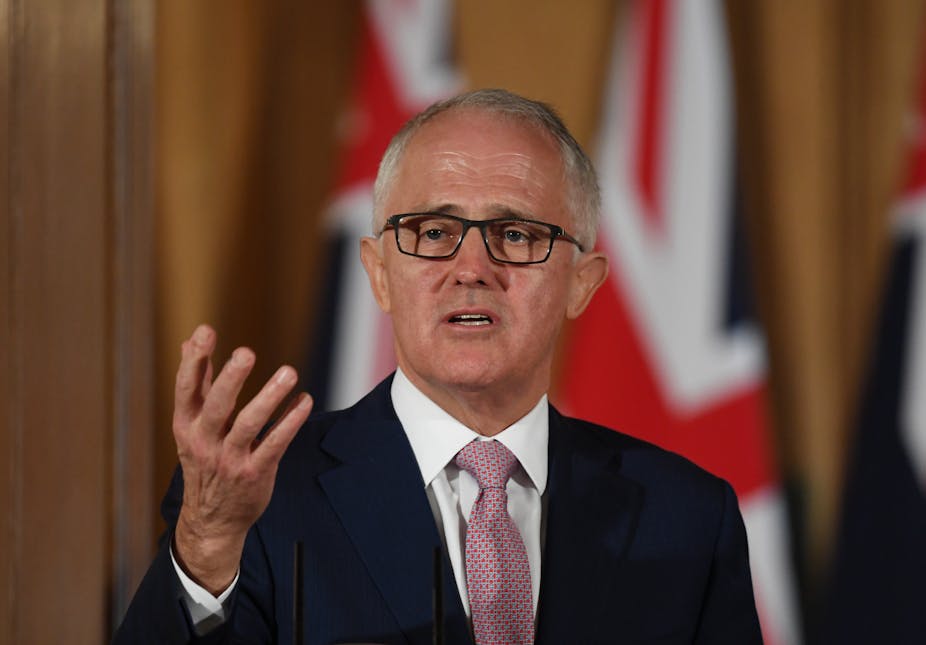It’s passing strange when Eric Abetz, the navy-blue conservative sacked from the ministry by Malcolm Turnbull, is out defending a prime ministerial speech on the Liberal party’s history and positioning.
But then, these are indeed the strangest of times on the non-left side of federal politics.
Turnbull’s Monday address in London to the centre-right Policy Exchange think tank presented a fairly conventional set of references to Robert Menzies’ founding of the Liberal party, most of which you’d find in the standard texts on the party’s past.
He noted that Menzies “went to great pains not to call his new political party, consolidating the centre right of Australian politics, ‘conservative’ – but rather the Liberal party which he firmly anchored in the centre of Australian politics.
"He wanted to stand apart from the big money, business establishment politics of traditional ‘conservative’ parties of the right, as well as from the socialist tradition of the Australian Labor party, the political wing of the union movement.”
He quoted Menzies’ words: “We took the name ‘Liberal’ because we were determined to be a progressive party, willing to make experiments, in no sense reactionary but believing in the individual, his right and his enterprise, and rejecting the socialist panacea”.
Turnbull declared: “The sensible centre, to use my predecessor Tony Abbott’s phrase, was the place to be and it remains the place to be now”.
Talk of the two streams in the Liberal party (John Howard’s “broad church”) is familiar. Wars over Menzies’ philosophical legacy have long been waged among the faithful. Menzies is an icon that both conservatives and liberals in the party try to claim for their own. And every Liberal leader wants, indeed needs, to link to Menzies.
In fact they can all find succour from the Menzies’ well – he was prime minister for a long time, a pragmatist, and dealt with and responded to varying circumstances.
If Turnbull on Monday was having a calculated slap at conservatives in the party, it was a pretty mild one. If he was emphasising he’s a centrist, that is hardly a surprise, although when he translates it into policy it annoys the hell out of those on the right.
Turnbull had made the same point in his April 1 speech to the Victorian Liberal council, when he told it that Menzies knew that the future “was in the sensible centre”. “Menzies was proudly liberal and conservative and he understood that you build on the continuity of the great institutions which gave our democracy birth … but above all, you build from the centre, bringing people together and that is our commitment”.
The reference to Abbott in his London speech gave Turnbull some body armour.
It was actually a latish insert. It was in the speech Turnbull delivered, and in the version sent out at 3.32 am EST. But the excerpts handed out very much earlier to the travelling media and reported in Tuesday morning’s papers in Australia did not contain it.
As it turned out, it was a judicious addition.
Abetz picked up on the Abbott reference to dispute a media report that said Turnbull’s remarks were likely to inflame the internal party battle. “I’m not sure how Prime Minister Turnbull quoting Prime Minister Abbott approvingly could be inflammatory”.
Of course everything Turnbull now says is taken as inflammatory. Being ready to combust is the default position of Turnbull’s party enemies (though not Abetz or some others on this occasion), the right in general, and a good section of the media.
Former Victorian Liberal premier Jeff Kennett was scathing, questioning why “Malcolm has chosen to actually have a brawl with his own from overseas”, showing “an appalling lack of political judgment”. Shock jock Alan Jones described the speech as “rather indecipherable”. Former Liberal senator Cory Bernardi claimed “I have no doubt that Sir Robert Menzies would be joining the Australian Conservatives.”
While what he said in the London speech was perfectly reasonable, as well as being previously-walked territory, whether he should have said it is open to argument.
The cautious approach would have been for Turnbull, in a speech overseas, to avoid anything that could lead to trouble in the ranks. Until the speech, his trip had given him a respite from the wrangling.
On the other hand, if Turnbull can’t say a few obvious – indeed can we say sensible - things, he will have forfeited his leadership in everything but the title.

